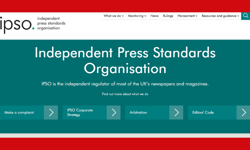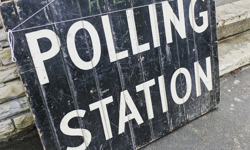Phew! That was close.
Only the defiance of David Cameron and a few key ministers blocked a parliamentary majority in favour of implementing Lord Justice Leveson’s recommendation that it was “essential” for a new independent regulatory system for the press to be backed up by statute.
Cameron told the Commons he had "serious misgivings" about independent self regulation of the press being underpinned by statute because: "We would have crossed the Rubicon of writing elements of press regulation into the law of the land, we should be wary of legislation that has potential to infringe free speech and a free press."
The Daily Mail hailed the Prime Minister in an editorial: “To his enormous credit David Cameron sees this report for what it is — a mortal threat to the British people’s historic right to know. If he prevails in protecting that right, with the help of like-minded freedom lovers in the Commons and Lords, he will earn a place of honour in our history.”
But the payback was immediate. After national newspaper editors were called to a meeting in Downing Street, in a move likened by Telegraph editor Tony Gallagher to “the summoning of the Five Families in The Godfather", they agreed to accept the vast majority of the Leveson Report recommendations – bar a role for Ofcom or another statutory body auditing the work of a new press regulator.
Uniting Fleet Street has never been an easy task. In the run-up to Leveson, the editors were unable to agree over the Lord Hunt-Lord Black plan for toughened up self-regulation. Even now, a major split within Fleet Street, a maverick publisher or another scandal like phone hacking could see some statutory control of the press.
The five principles
The publishers’ trade bodies representing the national, regional press and magazines, the NPA, the Newspaper Society and PPA, quickly accepted the five Leveson principles outlined by the Prime Minister for a new press regulator. These are:
* Independence of appointments and funding;
* A standards code;
* An arbitration service;
* A speedy complaint-handling mechanism;
* Power to demand up-front, prominent apologies and impose million-pound fines.
It was agreed that Lord Hunt would be the point of contact between publishers and the Government. A working group of industry lawyers, editors and senior executives reporting to Lord Hunt was established to work on a draft contract and regulations which will be “Leveson-compliant”. Chris Smith, the former Labour culture secretary, ex-Times editor Simon Jenkins and Lord Phillips, the former president of the Supreme Court, have been appointed as special advisers who will help set up a new press regulator.
Lord Justice Leveson’s verdict after his 14-month investigation into the culture, practices and ethics of the press was damning: “There have been too many times when, chasing the story, parts of the press have acted as if its own code, which it wrote, simply did not exist. This has caused real hardship and, on occasion, wreaked havoc with the lives of innocent people whose rights and liberties have been disdained.
“This is not just the famous but ordinary members of the public, caught up in events (many of them, truly tragic) far larger than they could cope with but made much, much worse by press behaviour that, at times, can only be described as outrageous."
He declared: "In order to give effect to the incentives that I have outlined, it is essential that there should be legislation to underpin the independent self-regulatory system and facilitate its recognition in legal processes."
Magazines and regional papers
But, it wasn’t all bad. This is what the judge said about magazines: “Most of these consumer magazines are specialist interest titles of varying sorts and are not engaged in the sort of news and current affairs reporting, or reporting on individuals, with which the Inquiry is primarily concerned.”
The report also commented: “Whereas newspapers are essentially ephemeral, and understandably have developed a reputation as tomorrow’s fish and chip wrappers, magazines are kept and referred to because they are considered to be a ‘trusted friend’.”
He was also full of praise for the regional press: “In relation to regional and local newspapers, I do not make a specific recommendation but I suggest that the Government should look urgently at what action it might be able to take to help safeguard the ongoing viability of this much valued and important part of the British press. It is clear to me that local, high-quality and trusted newspapers are good for our communities, our identity and our democracy and play an important social role.”
Leveson said the regulatory model proposed in his report “should not provide an added burden to the regional and local press.”
Newspaper Society director David Newell points out: “There are thousands of newspapers and magazines in the UK, and thousands of journalists that work for them. The evidence to Leveson has demonstrated that the real focus of his Inquiry has been on the behaviour of substantially less than one percent of those newspapers and magazines and the journalists which work for them.”
Statutory underpinning
Journalists of all people know the good things Leveson said about magazines and regional papers were not going to make the headlines about his report. Instead the focus was on whether or not the Government would back Lord Justice Leveson’s recommendation for the new independent regulatory system for the press to be backed up by statute, a move opposed by most publishers and editors as a step too far after 300 years of a press free from any direct parliamentary control.
Leveson left it up to the press to bring forward proposals for a new independent regulatory system with powers to fine newspapers up to £1 million and investigate alleged wrongdoing.
The judge recommended that as an incentive to membership, a new regulatory body should consider establishing a kite mark for use by members to establish a recognised brand of trusted journalism.
He said the new body should review the Code of Practice, on which the public should be engaged and consulted, with the aim of developing a clearer statement of the standards expected of editors and journalists.
To protect journalists, it was recommended the regulatory body should establish a whistle-blowing hotline for those who feel that they are being asked to do things which are contrary to the code. The report added: “The industry generally and a regulatory body in particular should consider requiring its members to include in the employment or service contracts with journalists a clause to the effect that no disciplinary action would be taken against a journalist as a result of a refusal to act in a manner which is contrary to the code of practice.”
There is a carrot in the shape of the proposed new arbitration service open to those joining the new press regulatory system that would cut legal costs for publishers. Leveson said the arbitration service, staffed by retired judges or senior lawyers with specialist knowledge of media law would be quick, fair and low cost.
But, if publishers chose not to subscribe to the regulatory body, they could face claims for exemplary damages. The judge said: “I believe that these proposals in relation to costs should provide a powerful incentive for all publishers to want to be a part of such a self-regulatory system.”
Labour leader Ed Miliband has drawn back from his initial call for the Leveson Report to be implemented in full as his party published a draft press regulation bill.
It called for a new regulator to be created overseen by the Lord Chief Justice, rather than Ofcom as Lord Justice Leveson suggested. Under the Labour plans, a panel headed by the Lord Chief Justice would determine every three years whether the regulator was carrying out its functions properly.
Critics saw something of Orwellian doublethink in naming a bill aimed at regulating the press as the “Press Freedom Bill”. Liberal Democrat Lord Lester has published a draft press regulation bill suggesting a regulator should be overseen by the president of the Supreme Court.
An alternative proposal from Cabinet Office minister Oliver Letwin would see a new press regulator backed by a royal charter, with a group of leading public figures with no links to newspaper publishers overseeing the new body.
Other publisher concerns
Apart from the call for statutory underpinning, there are also concerns about Leveson’s recommendations on the Data Protection Act, which could see journalists losing existing protections and be required to disclose data which could identify sources and prevent proper investigative journalism.
Changes recommended to curtail off-the-record briefings, aimed at improving transparency, are seen as creating a barrier which would prevent sources and whistle-blowers speaking out.
The report was taken to task for paying little attention to the internet which was described as operating in an “ethical vacuum”.
Lord Justice Leveson’s fear that his report might end up gathering dust on a journalism professor’s shelves seems unfounded. What has been ground into the dust is the reputation of journalists and journalism which has suffered collateral damage in the fallout from phone hacking.
The judge stressed: “There is no organised profession, trade or industry in which the serious failings of the few are overlooked because of the good done by the many.” Those failings are not being overlooked by the public.
Anne Pickles, associate editor of Cumbrian Newspapers, told the Inquiry: “We get the backlash when there is a fuss about the behaviour of the media.” She gave the example of a reader ringing to complain about a court report stating, “I know how you people work. I’ve seen the Leveson Inquiry.”
Pickles in her statement to Leveson added: “Public perception of all media, since the Leveson Inquiry started, has been mistakenly to assume all print press is being viewed as untrustworthy, self-seeking and corrupt.”
The public perception of British journalism is unlikely to be improved as the series of court cases involving News International executives and journalists facing hacking and corruption charges unfold this year.
A lifelong journalist who has worked in the regional and national press, for magazines and in PR told me: “You know, I used to be proud to say ‘I’m a journalist’ – now I feel ashamed.”












